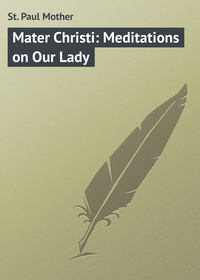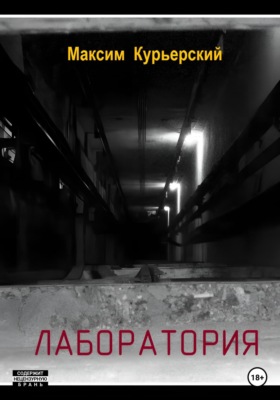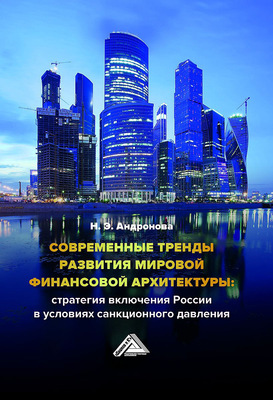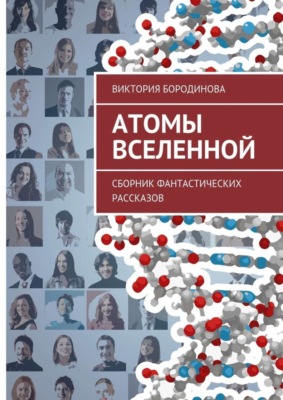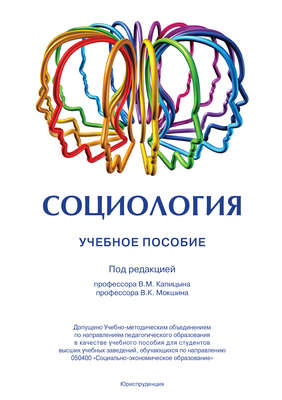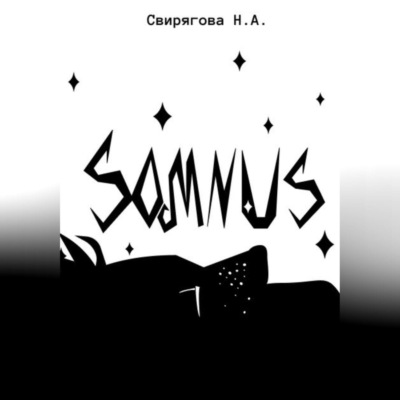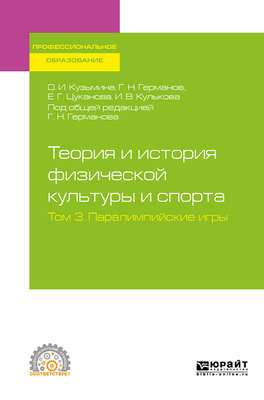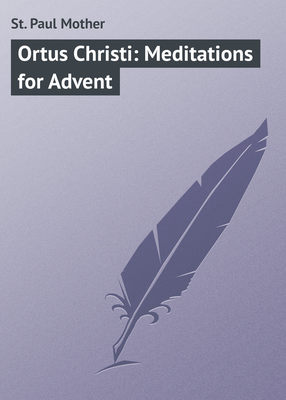Читать книгу: «Mater Christi: Meditations on Our Lady», страница 9
Mary's Death
"They that work by me shall not sin." (From the Epistle for the Vigil of the Assumption, Ecclus. xxiv. 30.)
1st Prelude. A picture of Mary's death.
2nd Prelude. To prepare for death by living "by Mary."
Point I.– "The sting of death is sin" (1 Cor. xv. 56)
Sin had never touched Mary; there was therefore for her no sting in death. She had no penalty to pay, neither had she to die for others as her Son died. Why, then, should Mary die?
1. Because she had a mortal nature. She belonged to the great human race, and it was therefore appointed unto her to die. (Heb. ix. 27.)
2. Because she chose to die (the Fathers say her Son gave her the choice) that she might be conformable in all things to her Son, and also that she might be the better able to help, and pray for, and sympathise with her children, who throughout all time would be constantly saying: "Pray for us sinners now and at the hour of our death."
3. Because Our Lord wanted her to have a specially chosen death – one that came neither from old age nor sickness, but simply from love. Her love for Him was so great that her body could no longer hold her soul captive.
4. Because God would not deprive her of the inestimable privilege of making the sacrifice of her life to Him, and such a life! This practice it is which makes the death of His Saints precious in the sight of the Lord. (Ps. cxv. 15.)
Let us learn two lessons: —
1. To choose to be in all things conformable to Jesus, even though this choice means death to self.
2. How precious a thing in God's sight is the sacrifice of their lives to Him by His children! Let us resolve to make Him this sacrifice often beforehand – at least every night before we take from His Hands the precious gift of sleep which "He giveth His beloved."
Point II.– Mary's Preparation for Death
We are told that some little while before her death an Angel (probably Gabriel) was sent to tell her that her time was at hand. She answered: Ecce ancilla Domini ("Behold the handmaid of the Lord"), and made once again the sacrifice of her life. She then told the news to John, who made it known to the faithful. How great their sorrow must have been at the prospect of losing such a Mother! St Denis tells us that Our Lord brought all the Apostles and missionaries, who were scattered all over the world, to witness her death. She blessed them, and encouraged them to continue their work, saying that she would help them powerfully in Heaven. Her joy was full because the time, which was to unite her to her Son, had come at last; but Mary was not selfish in her joy any more than she had been in her grief. She did not forget the sorrow of her children; they were still to be exiles, but exiles with a Mother in the Homeland – a Mother who would be there to befriend them and take an interest in all they were doing.
Do I realise this – that while I am an exile here I have a Mother in Heaven who is taking the keenest interest in all that concerns me, in all that is preparing me for my Home; a Mother who is waiting there for me, ready to welcome me?
Point III.– How Mary Died
There was no sickness, no wearing out nor decay of that beautiful body, no effects in it of original sin. Of what, then, did Mary die? Of two things —love and desire; and these were so intense that even her body, strong and perfect though it was, had not the power to detain the soul captive any longer. Mary died of love, as her Son had died of grief – a grief which was the outcome of an immense love. Did Mary receive the Last Sacraments? The Sacrament of Penance was out of the question for her sinless soul; we may doubt about Extreme Unction; but with what intensity of love and desire must she have received her Viaticum! And when Jesus came with all His court to fetch her immaculate soul, we are told that she said: "Thy will be done; for a long time I have sighed after Thee, my Son and my God; nothing can be more delightful than to join Thee and be where Thou art for ever."
Then the Angels began to sing – all who were present heard them – and while they sang, Mary said her Fiat and died, and her most pure soul began its eternal happiness in the sight of the Beatific Vision. The Eternal Trinity gave it the glory which was its due – the reward of her love so pure, so generous, so constant. She had a higher degree of glory and a clearer vision of God than all the Saints, because glory depends on grace, virtue, and merit, of which she had far more than any of them.
What does Mary's death say to me? "They that work by me shall not sin." You cannot be sinless, as I was, you cannot die of love, as I did, (St Theresa and St Philip of Neri did), but you can, by keeping close to me, and doing all your work at my side, keep from all wilful sin, and you can thus love Jesus so much that when He comes to fetch you, death will have no terrors for you, and you, too, will be able to say: Ecce ancilla Domini, Here I am, Thy servant, doing Thy work. "Blessed is that servant whom the Lord when He cometh shall find watching"; and the best way to watch is to work at Mary's side.
And let me never forget that my degree of glory in Heaven will be according to the amount of grace and merit that I have at the moment of my death. How thankful I should be that I still have power to increase these! And how eager and zealous to use my time to the best advantage! Death cometh when no man can work – when no more merit, no more reparation will be possible. The point I have then reached will be mine through all eternity. "As the tree falls, so will it lie." Holy Mary, Mother of God, pray for me now and at the hour of my death.
Colloquy with Mary, my Mother in Heaven, who is pleading for me; who is letting me do all my work close to her side; and who will be there at the hour of my death, to put me back into the Hands of her Son, Who gave me to her when He was on the Cross, saying: "Take this child and nurse it for Me." And He will see to it that none shall pluck me out of His Hands, for it is impossible for a child of Mary to be lost.
Resolution. To let love for her Son keep me close to Mary's side to-day, listening to all her directions about my work, so that I may do it to please Him.
Spiritual Bouquet. "They that work by me shall not sin."
Mary's Tomb
"I gave a sweet smell like cinnamon and aromatical balm; I yielded a sweet odour like the best myrrh." (Ecclus. xxiv. 20.)
"In the Holy City likewise I rested, and my abode is in the full assembly of the Saints." (verses 15, 16.)
1st Prelude. The Apostles carrying the body of their Mother to the grave.
2nd Prelude. The grace of faith and love to penetrate into these mysteries.
Point I.– Mary's Body
The Angels still continued singing, while the Apostles and missionaries and women wept around the body. But the heavenly music was catching, and it was not long before the mourners dried their tears and joined in the Angels' hymn of praise. We are told that the sick and the blind and the lame were allowed to come and kiss the precious body, and that in so doing they were instantly healed. Why was Mary's body so precious? Because it had been the tabernacle of the Son of God. Why is mine so precious? Because it, too, is so often the tabernacle of Jesus Christ. Do I realise that this makes my body holy? And do I regard it as something precious, consecrated and dedicated, God's Temple, His own dwelling-place? Often have Angels adored before it! How much respect, then, ought I to show it! How careful I ought to be as to what I do with it, and to what use I put it!
We are told that when the Apostles carried the bier to the grave, near the Garden of Gethsemani, all the faithful accompanied them, and the Angels never ceased their singing. The precious body exhaled a sweet fragrance which perfumed every place the procession had to pass through, and there were miracles and conversions all along the route. They laid their precious burden in the grave, put a great stone over it, and then dispersed. But they did not leave the grave alone. The Apostles watched and prayed there in turn, listening to, and rejoicing in the Angels' song.
Point II.– The Empty Tomb
On the third day, St Thomas arrived from the Indies (the Apostles felt sure that it was Our Lord's plan that he should be late), and naturally wanted to look once again on his Mother's face. So they removed the stone, but only to find an empty tomb. They found the linen and clothes all in order, and they noted the delicious fragrance, but the body was gone; the soul had come back for it and fetched it to share in its glory. Then the Apostles remembered that during the morning the celestial singing had suddenly stopped, and they knew that their Mother, clothed in her glorified body, was even then sitting at the Right Hand of her Son in Heaven. Why was it? Why was her body not left in the tomb? Because it was impossible for that body, from which the Word had taken Flesh, and which had never been touched by sin, to "see corruption." Also, although Mary had to die, and to bear the separation of soul and body, there was no necessity in her case for that penalty to be prolonged. God would not keep her – a perfect human creature – in an imperfect state, which the soul without the body must ever be. So, though not yet a dogma, the Assumption of the Blessed Virgin Mary has ever been a belief of the Church. If we need a proof, let us call to mind the fact that no one has ever pretended to possess relics of Our Lady's body. Our Lord would surely never have deprived the Church of such treasures, had they existed.
Point III.– The Fourth Glorious Mystery
Let me turn from the empty tomb, and try to realise the other side of the picture – Mary in Heaven. This Fourth Glorious Mystery was foretold more than once in Holy Scripture: "Arise, O Lord, into Thy resting-place; Thou, and the Ark which Thou hast sanctified." (Ps. cxxxi. 8.) What is this ark sanctified by God but Mary's body, of which the Son of God took flesh?
"The Queen stood on Thy Right Hand in gilded clothing surrounded with variety." Who is this but the Queen of Heaven clothed with her glorious body of immortality?
"A Throne was set for the King's Mother, and she sat on His Right Hand," (3 Kings ii. 19), in all the dazzling beauty of her glorified body, surrounded by adoring Saints and Angels. Her Son on His Throne is saying to her: Ask, My Mother, for I will not say thee nay. The beauty of the scene is so entrancing, the light is so dazzling, the music is so enchanting, the mystery is so wonderful, that I feel almost bewildered and want to shut my eyes and think what it all means. It means this – that I have a Mother in Heaven, and that when her Son bends towards her from His Throne, and when all the hosts of Heaven hold their breath to catch what their Queen is saying, they hear her ask some little favour for me, her child on earth. Why? Because I am saying: "Holy Mary, Mother of God, pray for me now." Let me, with the eye of faith and love, penetrate the thin veil, which hides these wondrous mysteries from my sight. Let me try to see things as they really are, and then my prayers will be less formal.
Colloquy with Mary on the Right Hand of Jesus in Heaven.
Resolution. To think of her there when I say my Rosary to-day.
Spiritual Bouquet. "Holy Mary, Mother of God, pray for us sinners now and at the hour of our death."
"Who is She?"
(The Fourth Glorious Mystery)
"Quæ est ista quæ progreditur quasi aurora consurgens, pulchra ut luna, electa ut sol, terribilis ut castrorum acies ordinata?" "Who is she that cometh forth as the morning rising, fair as the moon, bright as the sun, terrible as an army set in array?" (Cant. vi. 9.)
1st Prelude. The Angels asking three times: "Who is she?" (Cant. iii. 6; vi. 9; viii. 5.)
2nd Prelude. Grace to understand who she is.
Point I.– "Who is she?"
"Who is she?" ask the Angels, as they see Mary coming into Heaven. Once before had One clothed in the robe of His beautiful, glorified Body passed through Heaven's portals; and the Angels had said: "Who is this that cometh with dyed garments from Bosra, this beautiful One in His robe?" (Isaias lxiii. 1), and they had opened wide Heaven's gate to let in the Conqueror of sin and death, the King of glory, the Lord mighty in battle. But who is she– a woman, who, though she is beautiful as the morning rising, fair as the moon, and bright as the sun, is also terrible as an army set in array? She also has come from the battlefield; she also is a conqueror, for she has crushed the serpent's head; she has undone Eve's terrible work, and, as far as a creature can, has made reparation for it. She it is who has stood like a rock amidst the most crushing sorrows. Her strength is terrible to the devil, but the Angels rejoice in it, and her children flee to her as the Refugium peccatorum, saying: Da mihi virtutem contra hostes tuos. (Give me, too, strength against thy enemies.) And so the Angels open wide Heaven's gates again, to let in the Mother of the King – the Queen of Heaven —their Queen – who has earned her right to her throne; not by being the Mother of God, but by nobly fighting the battle against sin, the world, the flesh, and the devil.
"Maria Mater gratiæ,
Dulcis Parens clementiæ,
Tu nos ab hoste protege,
Et mortis hora suscipe."
(O Mary, Mother of grace, sweet fount of gentleness, do thou protect us from the enemy, and receive us in the hour of our death.)
And she will; she is there for her children. "Who is she?" She is our Mother; she will never forget it, though she is the Queen of Heaven, of Angels, and of Saints; and she will ever be terrible to all who dare to attack her children.
Point II.– "Who is she?"
"Who is she that goeth up by the desert as a pillar of smoke, of aromatical spices, of myrrh and frankincense, and of all the powders of the perfumer?" (Cant. iii. 6.) That is: Who is she who is adorned with all possible graces and virtues? "Who is she?" She is the "fairest among women" (chap. i. 7) because of her humility, answers the Angel who heard her say: Ecce ancilla Domini, at the most exalted moment of her life. "Who is she?" She is the "fairest among women" because of her conformity to God's will, say those who have heard over and over again her Fiat when the sword was piercing her soul. "Who is she?" We, too, can answer the question, for we know her. We have watched her, and meditated upon her life, from the moment of her Immaculate Conception till her holy death of love and desire; and we have seen that she has always been growing in grace and in conformity to her Divine Son. Yes, she is the "fairest among women," and she is my Mother and my model. How is it with me? Am I known to my friends, to those who live with me, to my Guardian Angel, yea, to the Blessed Trinity, as one, who is growing in virtue and grace; as one, whose conformity to Jesus and His will, is apparent from the use I make of the Ecce ancilla and the Fiat? There must be some resemblance between the child and the Mother.
Point III.– "Who is she?"
For the third time the Angels ask the question: "Who is she that cometh up from the desert flowing with delights, leaning upon her Beloved?" (chap. viii. 5.) There is no doubt about it now – she is His Mother, and her Beloved is Jesus, the Son of God and of Mary. What unspeakable joy is hers to find herself once more in the arms of her Beloved! "His left hand is under my head, and His right hand shall embrace me," (chap. ii. 6), and she leans upon Him. She had never left Him really; she had been leaning on Him all the time of her exile: by her memory, by her love, by her Communions, by her constant doing of His will. This is why I can so safely lean on Mary, the Mother of Good Counsel, because to lean on her is to lean on Jesus, on Whom she leans. She nurses her children for Him.
"Who is she that cometh up from the desert?" In spirit Mary had ever been coming up. Always had she sought "the things that are above, where Christ sitteth at the right hand of God." Her treasure was in Heaven, and nothing on earth had power to attract or attach her.
How far do I copy my Mother in this? Are my affections set on things above, where Jesus and Mary are? Have things of earth no attraction for me in comparison with heavenly things? Am I ready to give them up to Him to Whom they belong when He asks for them? Is my whole heart in Heaven because my treasure is there? This is what is meant by going up from the desert. It means striving always after what is more perfect. It means that each day finds me more charitable, more faithful, more careful about occasions of sin, more like my Mother. And it means also Sursum corda (Lift up your hearts) whenever the difficulties and sorrows of the desert seem too much.
Colloquy with Mary.
Resolution. To ask myself the question often to-day: "Who is she?"
Spiritual Bouquet. "Pulchra es et decora filia Jerusalem, terribilis ut castrorum acies ordinata." (Thou art fair and comely, O Daughter of Jerusalem, terrible as an army set in array.)
Mary's Coronation
(The Fifth Glorious Mystery)
"Thou wast made exceeding beautiful and wast advanced to be a Queen." (Ezech. xvi. 13.)
1st Prelude. The great sign which appeared in Heaven: "A woman clothed with the sun, and the moon under her feet, and on her head a crown of twelve stars." (Apoc. xii. 1.)
2nd Prelude. The grace so to live and die, that I may one day be crowned.
Point I.– Mary's Coronation
Specie tua et pulchritudine tua, intende, prospere procede, et regna. (In thy comeliness and thy beauty go forth, proceed prosperously, and reign.) The culminating point is reached, and Mary is led in triumph to receive her crown from the Blessed Trinity. God the Father crowns her as a Victor; God the Son as a Queen; and God the Holy Ghost as a Bride. We give our crowns on earth to victors, to queens and to brides. Mary was all of these for she had conquered the devil; she was the King's Mother, and she was the spouse of the Holy Ghost.
1. She was crowned as a Victor, as a sign of her courage and bravery. God the Father had seen the world, which He had created and had pronounced to be "very good," spoiled by sin. The Arch-fiend had entered Paradise, and had stolen away the hearts of His children, robbing them of His grace, and leaving them and all their descendants stained by sin. To Satan God had spoken of a woman whose Child would be his enemy; and of her He said: "She shall bruise thy head." Now the old prophecy has been fulfilled, and Mary stands before Him waiting for her crown. She has crushed the serpent; she has been terrible to all God's enemies; and the crown that the Eternal Father places on the head of His daughter is a token that she is indeed a Victor.
How did Mary win the Victor's crown? By her fidelity to grace. No one ever had so many occasions of grace, and she did not miss one of them.
"There is," somewhere in the heavenly courts, "a crown laid up for me." (2 Tim. iv. 8.) But "the Lord, the just Judge" will only give it me if "I have fought a good fight." (verse 7.) "To him that shall overcome will I give to sit with Me in My Throne." (Apoc. iii. 21). "Be thou faithful unto death, and I will give thee a crown of life." (chap. ii. 10.) "Hold fast that which thou hast, that no man take thy crown" (chap. iii. 11). All, then, depends on my efforts. I have got to be faithful, to fight, to overcome, and to hold fast. My consolation is that my Mother is interceding for me; my enemies are the same as hers, and she has overcome them. Da mihi virtutem contra hostes tuos.
2. She is crowned as a Queen. Her Son is the King of Heaven, and He crowns her as the Queen-Mother. "A throne was set for the King's Mother, and she sat on His Right Hand." (3 Kings ii. 19.) "The Queen stood at Thy Right Hand in gilded clothing, clothed round about with varieties." (Ps. xliv. 14.)
Kings and Queens wear their crowns in token of their power and authority. Jesus crowned His Mother in token of her power and authority. He made her Queen of Angels, of Patriarchs, Prophets, Apostles, Martyrs, Confessors, Virgins, and gave her not only authority over all these, but also, in a certain sense, if we may say so reverently, over Himself. He allowed her still to keep the sweet authority which she had exercised over Him at Nazareth, when He was "subject" to her; for He says to her: "My Mother, ask, for I must not turn away thy face." (3 Kings ii. 20.) How He loves us – even to the extent of pledging Himself to answer the intercessory prayer of one who He knows will make full use of her privilege – one who is even now turning to me, her child, and saying: "I will speak for thee to the King." (verse 18). Let me determine to have my share in this blessed compact between the Son and the Mother, by continually asking my Queen-Mother for her intercession. Sancta Dei Genitrix, ora pro nobis.
3. The Holy Ghost crowns her as His Spouse. "Come from Libanus, my spouse; come and thou shalt be crowned." (Cant. iv. 8.) "Faithful unto death" she had been; ever since her Immaculate Conception she had always listened to the least inspiration of grace which her Divine Spouse had suggested, and now she receives her reward, the "crown of life." The end is attained, and there is joy in the presence of the Angels of God.
Point II.– The Joy of the Angels
De cujus Assumptione gaudent Angeli et collaudant Filium Dei. At whose Assumption the Angels rejoice and praise together the Son of God. (Introit for the Feast of the Assumption.)
What were the causes of their joy?
1. Mary's joy at her re-union with her Son.
2. Her reception and coronation as their Queen.
3. Her being placed on the throne at her Son's Right Hand.
4. The sight of her beautiful glorified body – the means of the Incarnation – before which, as before the Tabernacle, they had so often worshipped their hidden God.
5. The likeness between the Mother and the Son – a likeness which had been increasing during her years of exile, by means of the Blessed Sacrament.
6. Hearing Jesus call her Mother. "My Mother, ask."
7. Seeing the great Intercessor at her work praying for sinners, in whom they take such an interest.
And the result of their joy is that "they praise together the Son of God" – that is, they perfectly fulfil the end for which they were created, teaching us the great lesson that the more we know Mary and rejoice in her joy, her position and her work, the more we shall know and praise her Divine Son, and so fulfil the end for which we were created.
But it is not only the Angels who are rejoicing. She is "Queen of all Saints" as well as "Queen of Angels," and the Church Triumphant is swelling the chorus of joy. Each member of that spotless multitude has already been a cause of joy in Heaven, for there is joy in the presence of the Angels of God over every sinner that doeth penance. (St Luke xv. 7.) "Joy cometh in the morning" after the night of doing penance. "No cross, no crown." It is because Mary is the "Mother of Sorrows" that she is able to be the "Cause of our joy," and we must all pass by the same route.
Help me, my Mother, to share the joy of the Angels and Saints even in the "valley of tears." It is possible, but it can only be done by a faith strong enough to see things as they really are.
And what about Mary's joy? As she stands in the midst of that great multitude of Angels and Saints, who are vying with each other to do her honour, her heart too is overflowing with joy, but it is all for her Son. The honour and worship that are being paid to her are His; they are because of "the great things He has done" for her. She is only His handmaid, and she is always singing her Magnificat: "My soul doth magnify the Lord, my spirit doth rejoice in God my Saviour." Humility is ever her greatest virtue, and she shows it on her Coronation Day by casting her crown at the Feet of Him Who redeemed her with His Blood – her Son, her Saviour, and her God.
Colloquy. The Ave Regina Cælorum: – "Hail, Queen of Heaven! Hail, Lady of the Angels! Hail, blessed root and gate, from which came light upon the world! Rejoice, O glorious Virgin, that surpassest all in beauty! Hail, most lovely Queen! and pray to Christ for us." (Anthem from Purification to Easter.)
Resolution. To work for my crown to-day.
Spiritual Bouquet. "Ora pro nobis, Sancta Dei Genitrix, ut digni efficiamur promissionibus Christi."
Покупайте книги и получайте бонусы в Литрес, Читай-городе и Буквоеде.
Участвовать в бонусной программе
